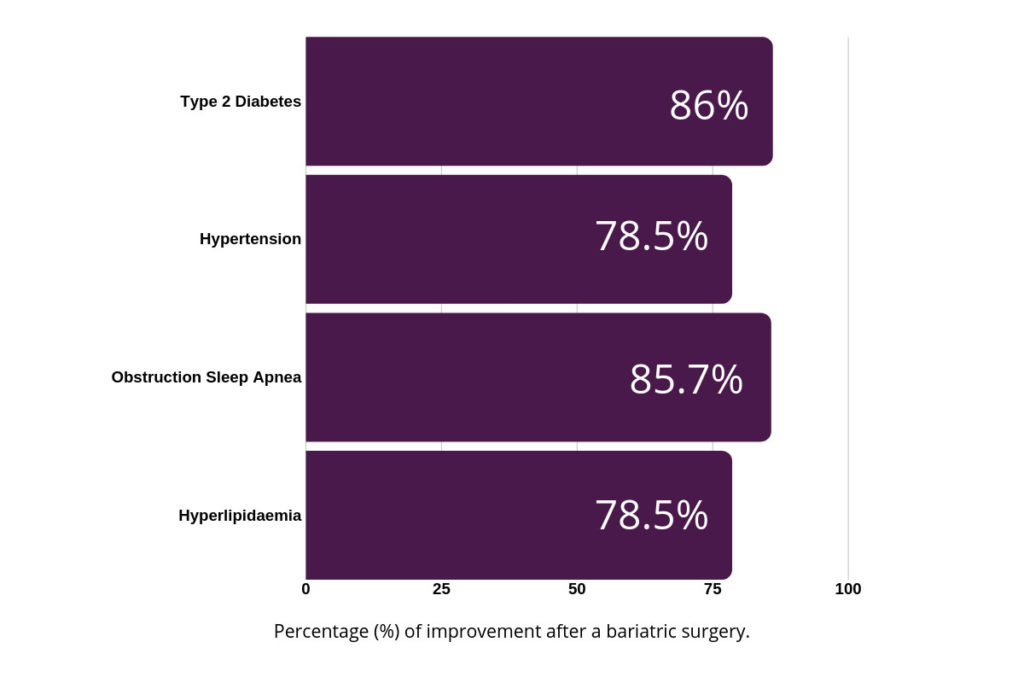Recently, a patient named Mr Lee thanked me for giving him a new lease of life. Mr Lee was obese, burdened with diabetes for the past 10 years and he was started on insulin injection about 2 years ago.
His weight was approaching 110kg and he struggled to lose the excess weight. A mutual friend introduced us and I did what I was specialised in, a surgery that would help him shed the extra kilograms.
In just one year time, he has lost all the excess weight, surpassing both our expectations and now weighs 67k. His endocrinologist stopped his insulin not long after the surgery and he is off his diabetic medication. Mr Lee is fitter than ever, playing golf without experiencing shortness of breath and recently was recently promoted to CEO of a subsidiary of a listed company.

Today, tens of thousands of Malaysians are like Mr Lee, who is overweight with many obesity-related medical conditions such as:
- diabetes
- high blood pressure
- sleep apnea
- fatty liver
- high blood cholesterol
We now label this pattern of diseases as metabolic syndrome.
In the Klang Valley, it is quite common for patients like Mr Lee visiting different specialists to get treatment for each disease. For example, a cardiologist for hypertension monitoring, an endocrinologist to check rising blood sugar, an ENT surgeon for obstructive sleep apnea or consulting an orthopaedic surgeon for knee or back pain that could be linked to obesity. All these different specialists do recognize losing weight is paramount to control the disease, but the truth is, encouraging and motivating patients to lose weight is easier said than done.
Many medical societies now recognize weight loss surgery as one of the medical treatments for patients who are morbidly obese and struggling to control metabolic diseases as mentioned above. Further high-level evidence studies show that patients who have had weight loss surgery live longer than those who get conservative treatment.

In addition, there are many studies have shown that Type 2 diabetes is reversed or better controlled after surgery, with the effects lasting for at least 5 years. Some data even show improvement for as long as 20 years.
There are several forms of weight loss surgery with the most common being Laparoscopic Sleeve Gastrectomy. This involves removing close to 75% of the stomach and turning it into a sleeve or tube-like structure. After surgery, patients lose most of their capacity to eat the volume of food they used to.
The next notable surgery is Laparoscopic Gastric Bypass, which involves creating a very small stomach pouch close to the oesophagus (food pipe). Then, a significant length of the small intestine is bypassed to delay the absorption of nutrients.

There is no significant difference in these two surgeries in terms of weight loss, although a gastric bypass controls the patient’s blood sugar better even before any weight loss because of some hormonal changes secondary to bypass of the intestine. Weight loss surgery does carry risks but if it is performed by well-trained bariatric surgeon, it can be safer than doing an emergency gall bladder removal surgery, the reason being that it is elective surgery.
Weight loss surgery is nothing new and can be traced back to the 1950s.
Various forms of surgery have come and gone but I dare say the procedures mentioned above are backed by good medium to long term data. Malaysians, in general, are afraid of surgery, what’s more when a doctor asks to take out a piece of your stomach or re-route the intestine when they are perfectly “fine”.
This is a common perception, even amongst physicians, why “cut your stomach” when you have no cancer? As a surgeon, sometimes I had to remove cancerous growths from symptomatic patients to improve their quality of life, even though some of them had, at most, one to two years to live.

While most obese individuals are “healthy”, some may have diabetes, and some may have a debilitating knee problem, but in general, they are not critically-ill. If there is one surgery that can improve an obese individual’s life or delay the development of complications from obesity-related conditions, why not consider surgery?
In a nutshell, surgery is not a shortcut to weight loss. It gives you a window of opportunity to lighten your weight and boost your self-esteem while you try to change your lifestyle and experience a sustainable long-term weight loss.